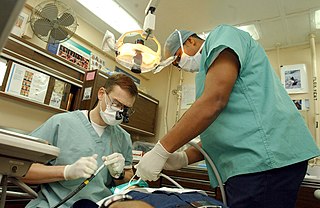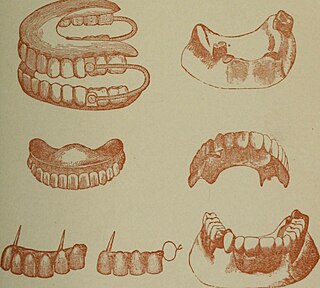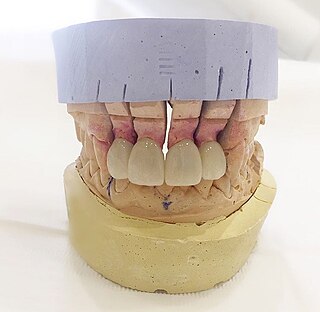Related Research Articles

A dentist, also known as a dental surgeon, is a health care professional who specializes in dentistry, the branch of medicine focused on the teeth, gums, and mouth. The dentist's supporting team aids in providing oral health services. The dental team includes dental assistants, dental hygienists, dental technicians, and sometimes dental therapists.

The Nursing and Midwifery Council (NMC) is the regulator for nursing and midwifery professions in the UK. The NMC maintains a register of all nurses, midwives and specialist community public health nurses and nursing associates eligible to practise within the UK. It sets and reviews standards for their education, training, conduct and performance. The NMC also investigates allegations of impaired fitness to practise.

The British Dental Association (BDA) is a registered trade union for dentists in the United Kingdom.

A dental hygienist or oral hygienist is a licensed dental professional, registered with a dental association or regulatory body within their country of practice. Prior to completing clinical and written board examinations, registered dental hygienists must have either an associate's or bachelor's degree in dental hygiene from an accredited college or university. Once registered, hygienists are primary healthcare professionals who work independently of or alongside dentists and other dental professionals to provide full oral health care. They have the training and education that focus on and specialize in the prevention and treatment of many oral diseases.
The Health and Care Professions Council (HCPC), formerly the Health Professions Council (HPC), is a statutory regulator of over 280,000 professionals from 15 health and care professions in the United Kingdom. The Council reports its main purpose is to protect the public. It does this by setting and maintaining standards of proficiency and conduct for the professions it regulates. Its key functions include approving education and training programmes which health and care professionals must complete before they can register with the HCPC; and maintaining and publishing a Register of health and care providers who meet pre-determined professional requirements and standards of practice.

Dental assistants are members of the dental team. They support a dental operator in providing more efficient dental treatment. Dental assistants are distinguished from other groups of dental auxiliaries by differing training, roles and patient scopes.

The General Medical Council (GMC) is a public body that maintains the official register of medical practitioners within the United Kingdom. Its chief responsibility is to "protect, promote and maintain the health and safety of the public" by controlling entry to the register, and suspending or removing members when necessary. It also sets the standards for medical schools in the UK. Membership of the register confers substantial privileges under Part VI of the Medical Act 1983. It is a criminal offence to make a false claim of membership. The GMC is supported by fees paid by its members, and it became a registered charity in 2001.
The Dental Professionals Association, previously known as the Dental Practitioners Association and the General Dental Practitioners Association, is a trade union for professionals involved in primary dental care in the United Kingdom. It is based in Harley Street in London.
The Pharmaceutical Society of Northern Ireland (PSNI) is the regulatory and professional body for pharmacy in Northern Ireland.
A health professional, healthcare professional, or healthcare worker is a provider of health care treatment and advice based on formal training and experience. The field includes those who work as a nurse, physician, physician assistant, registered dietitian, veterinarian, veterinary technician, optometrist, pharmacist, pharmacy technician, medical assistant, physical therapist, occupational therapist, dentist, midwife, psychologist, audiologist, or healthcare scientist, or who perform services in allied health professions. Experts in public health and community health are also health professionals.

A denturist in the United States and Canada, clinical dental technologist in the United Kingdom and Ireland, dental prosthetist in Australia, or a clinical dental technician in New Zealand is a member of the oral health care team and role as primary oral health care provider who provides an oral health examination, planning treatment, takes impressions of the surrounding oral tissues, constructs and delivers removable oral prosthesis treatment directly to the patient.

Dental laboratories manufacture or customize a variety of products to assist in the provision of oral health care by a licensed dentist. These products include crowns, bridges, dentures and other dental products. Dental lab technicians follow a prescription from a licensed dentist when manufacturing these items, which include prosthetic devices and therapeutic devices. The FDA regulates these products as medical devices and they are therefore subject to FDA's good manufacturing practice ("GMP") and quality system ("QS") requirements. In most cases, however, they are exempt from manufacturer registration requirements. Some of the most common restorations manufactured include crowns, bridges, dentures, and dental implants. Dental implants is one of the most advanced dental technologies in the field of dentistry.
A dental therapist is a member of the dental team who provides preventive and restorative dental care for children and adults. The precise role varies and is dependent on the therapist's education and the various dental regulations and guidelines of each country.
A registered dental nurse (RDN) in the United Kingdom works as part of a dental team in a variety of clinical and non-clinical settings.
Special needs dentistry, also known as special care dentistry, is a dental specialty that deals with the oral health problems of geriatric patients, patients with intellectual disabilities, and patients with other medical, physical, or psychiatric issues.
Dental bodies corporate (DBC) are corporations entitled to practice dentistry in the UK using the structure of a limited company.

Health professional requisites refer to the regulations used by countries to control the quality of health workers practicing in their jurisdictions and to control the size of the health labour market. They include licensure, certification and proof of minimum training for regulated health professions.
The General Pharmaceutical Council (GPhC) is the body responsible for the independent regulation of the pharmacy profession within England, Scotland and Wales, responsible for the regulation of pharmacists, pharmacy technicians and pharmacy premises. It was created, along with the Royal Pharmaceutical Society, in September 2010 when the previous body responsible for regulation, the Royal Pharmaceutical Society of Great Britain, was split so that representative and regulatory functions of the pharmacy profession could be separated.
The Health Services functional constituency, formerly called the Health Care, was a functional constituency in the elections for the Legislative Council of Hong Kong first created for the 1988 Legislative Council election. The constituency is composed of health services related professionals with one of the larger number of electorates among the functional constituencies. It was a stronghold of the pro-democracy camp, holding the seat since its creation. It was merged with Medical into Medical and Health Services functional constituency in the major electoral overhaul in 2021.
The Professional Standards Authority for Health and Social Care (PSA) oversees the ten statutory bodies that regulate health professionals in the United Kingdom and social care in England. Where occupations are not subject to statutory regulation, it sets standards for those organisations that hold voluntary registers and accredits those that meet them.
References
- ↑ "About us: Who we regulate". General Dental Council. Archived from the original on 29 July 2014. Retrieved 2 August 2014.
- ↑ "Contact us". General Dental Council. Archived from the original on 8 August 2014. Retrieved 9 August 2014.
- ↑ "About us: Policy development: Annual Retention Fee policy". General Dental Council. Archived from the original on 13 August 2014. Retrieved 20 September 2014.
- ↑ "Dental professionals: Apply for registration". General Dental Council. Archived from the original on 8 August 2014. Retrieved 9 August 2014.
- ↑ "Internal Caseworker Guidance: Dental nurse" (PDF). UK Government. December 2007. Retrieved 9 August 2014.
- ↑ "Dental professionals: Overseas registration exam". General Dental Council. Archived from the original on 21 February 2011. Retrieved 9 August 2014.
- ↑ "About us: Who are we: the council". General Dental Council. Archived from the original on 10 August 2014. Retrieved 9 August 2014.
- ↑ "Review of the Recruitment of the Council 2013" (PDF). General Dental Council. Retrieved 9 August 2014.[ permanent dead link ]
- ↑ "Statutory Regulators Directory: Organisation Profile: General Dental Council (GDC)". Professional Standards Authority for Health and Social Care. Archived from the original on 29 November 2014. Retrieved 20 September 2014.
- 1 2 "Regulators: Overseeing Regulators". Professional Standards Authority for Health and Social Care. Retrieved 21 September 2014.
- ↑ Doherty, Ruth (12 September 2014). "Evlynne Gilvarry: GDC view on the 2014 ARF consultation". British Dental Journal. 217 (5): 218–20. doi:10.1038/sj.bdj.2014.784. PMID 25213516.
- ↑ "Press release: BDA tells GDC – "Step back or face legal challenge"". British Dental Association. 4 September 2014. Archived from the original on 20 September 2014. Retrieved 20 September 2014.
- ↑ "Performance Review - GDC 2016/17".
- ↑ "Audit of the General Dental Council's initial stages fitness to practise process" (PDF). Professional Standards Authority for Health and Social Care. December 2013. Archived from the original (PDF) on 3 March 2016. Retrieved 20 September 2014.
- ↑ "News: GDC Investigation 2014". Professional Standards Authority for Health and Social Care. 27 May 2014. Archived from the original on 3 November 2014. Retrieved 20 September 2014.
- ↑ "General Dental Council". Heraldry of the World. Retrieved 2 February 2021.